Filter by

Socialistic Brands : A Unique Category of Vintage Brands
Socialistic brands are signs with unique characteristics acquired through their use in particular historical circumstances. It is considered whether, decades after the fall of the iron curtain, the shared historical pedigree justifies different treatment of these signs. The author attempts to answer the question of what would constitute as unfair appropriation of these brands and discusses the …
- Edition
- 1
- ISBN/ISSN
- 9783845278810
- Collation
- 86 halaman
- Series Title
- -
- Call Number
- 658 ROG s
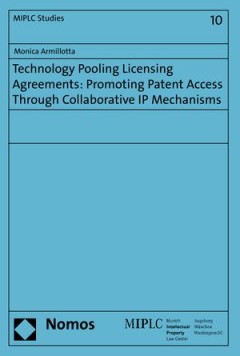
Technology Pooling Licensing Agreements : Promoting Patent Access Through Col…
Patent pools are essentially agreements where different patent holders “pool” together, i.e. assemble, their respective technologies in order to license them as a unique “package” to third parties.¹ Nowadays, in response to the globalisation of technologies and more severe conditions of competition, resulting in a faster pace of innovation also at an international level, technology poo…
- Edition
- 1
- ISBN/ISSN
- 9783845226316
- Collation
- 226 halaman
- Series Title
- -
- Call Number
- 620 ARM t
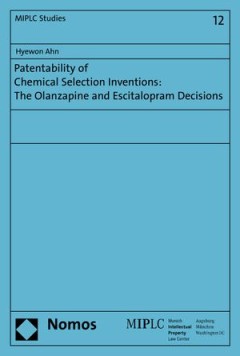
Patentability of Chemical Selection inventions : The Olanzapine and Escitalop…
The thesis is a response to the recent decisions of the German Federal Court of Justice on the patentability requirements of selection inventions, namely, the Olanzapine and Escitalopram decisions. This thesis provides an overview on the technology and patenting practice, followed by the discussion of jurisprudence on the patentability requirements for selection inventions in major jurisdiction…
- Edition
- 1
- ISBN/ISSN
- 9783845232188
- Collation
- -
- Series Title
- -
- Call Number
- 340 AHN p
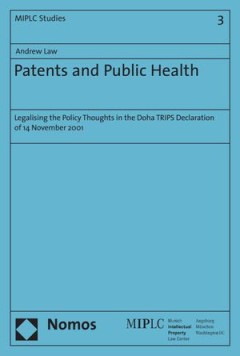
Patents and Public Health : Legalising the Policy Thoughts in the Doha TRIPS …
Do patents rules prevent countries from acquiring affordable medicines? A number of legal experts and governments have felt that the WTO, in particular the TRIPS Agreement, forces countries to favour patents over public health. The WTO sought to settle this dispute by concluding the Public Health Declaration. This book closely analyses the legal situation within the WTO prior to the Declaration…
- Edition
- 1
- ISBN/ISSN
- 9783845212654
- Collation
- -
- Series Title
- -
- Call Number
- 340 LAW p
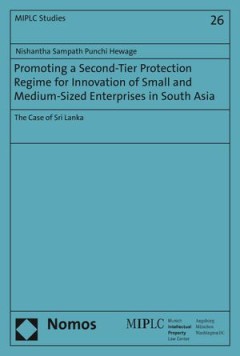
Promoting a Second-Tier Protection Regime for Innovation of Small and Medium-…
Intellectual Property law is a dynamic field; its ever-changing landscape challenges us to constantly revisit the existing laws and policies. Although ideological currents of a second-tier patent (STP) regime are sweeping through the South Asian region in recent years, the concept of utility model or petty patent remains a largely unexplored option in Sri Lanka and in other parts of the South A…
- Edition
- 1
- ISBN/ISSN
- 9783845259505
- Collation
- -
- Series Title
- -
- Call Number
- 340 HEW p

Copyright, the Freedom of Expression and the Right to Information : Exploring…
With the advent of a global community, which draws its sustenance from the unfettered communication of ideas and expression, it is worth reflecting on the role of copyright law and considering whether the existing legal frameworks of copyright in Europe have the capacity to meet the changing needs of a new generation who have given a whole new meaning to the term "creativity" and to that of "or…
- Edition
- -
- ISBN/ISSN
- 9783845231266
- Collation
- -
- Series Title
- -
- Call Number
- 340 MEN c

Revisiting China's Competition Law and Its Interaction with Intellectual Prop…
With the interplay between competition law and IP rights becoming ever more intense in major economies a functioning framework is required to discourage monopolistic behaviour while stimulating innovation and consumer protection. In this dissertation the author studies issues at the nexus between China’s Anti-Monopoly Law (AML) and a fast-evolving IP regime.De jurethe two legal systems pur…
- Edition
- 1
- ISBN/ISSN
- 9783845292687
- Collation
- -
- Series Title
- -
- Call Number
- 340 LIG r

The United States Bayh-Dole Act and its Effect on University Technology Transfer
This publication discusses one of the most influential pieces of legislation relating to technology transfer in the United States: The Bayh-Dole Act. The publication discusses the history that led to the groundbreaking Act, characterizes strengths and weaknesses of the Act from an economic and a policy standpoint, and details the recent Supreme Court Stanford v. Roche case, which may carry impl…
- Edition
- -
- ISBN/ISSN
- 9783845242217
- Collation
- -
- Series Title
- -
- Call Number
- 340 GOT u
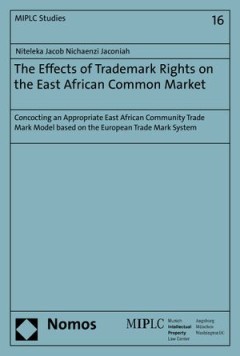
The Effects of Trademark Rights on the East African Common Market : Concoctin…
Trademark rights play a significant role in the proper functioning of a common market of a given regional bloc. Experience teaches that, unless national trade mark regimes of individual countries cooperating in a given regional bloc such as the East African Community (EAC) are integrated into a common market, trademark proprietors may invoke their intellectual property rights to dissect the com…
- Edition
- 1
- ISBN/ISSN
- 9783845242156
- Collation
- 276 halaman
- Series Title
- -
- Call Number
- 340 JAC e
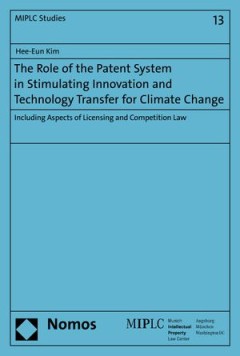
The Role of the Patent System in Stimulating Innovation and Technology Transf…
The world increasingly faces the adverse impact of climate change. What role can intellectual property play to stimulate the necessary innovation and technology transfer? Providing an inventory of patent law, policy and information, including certain private initiatives, this thesis discusses issues at the crossroads of intellectual property and climate change, such as: compulsory licensing for…
- Edition
- -
- ISBN/ISSN
- 9783845234472
- Collation
- 90 halaman
- Series Title
- -
- Call Number
- 340 KIM r
 Computer Science, Information & General Works
Computer Science, Information & General Works  Philosophy & Psychology
Philosophy & Psychology  Religion
Religion  Social Sciences
Social Sciences  Language
Language  Pure Science
Pure Science  Applied Sciences
Applied Sciences  Art & Recreation
Art & Recreation  Literature
Literature  History & Geography
History & Geography